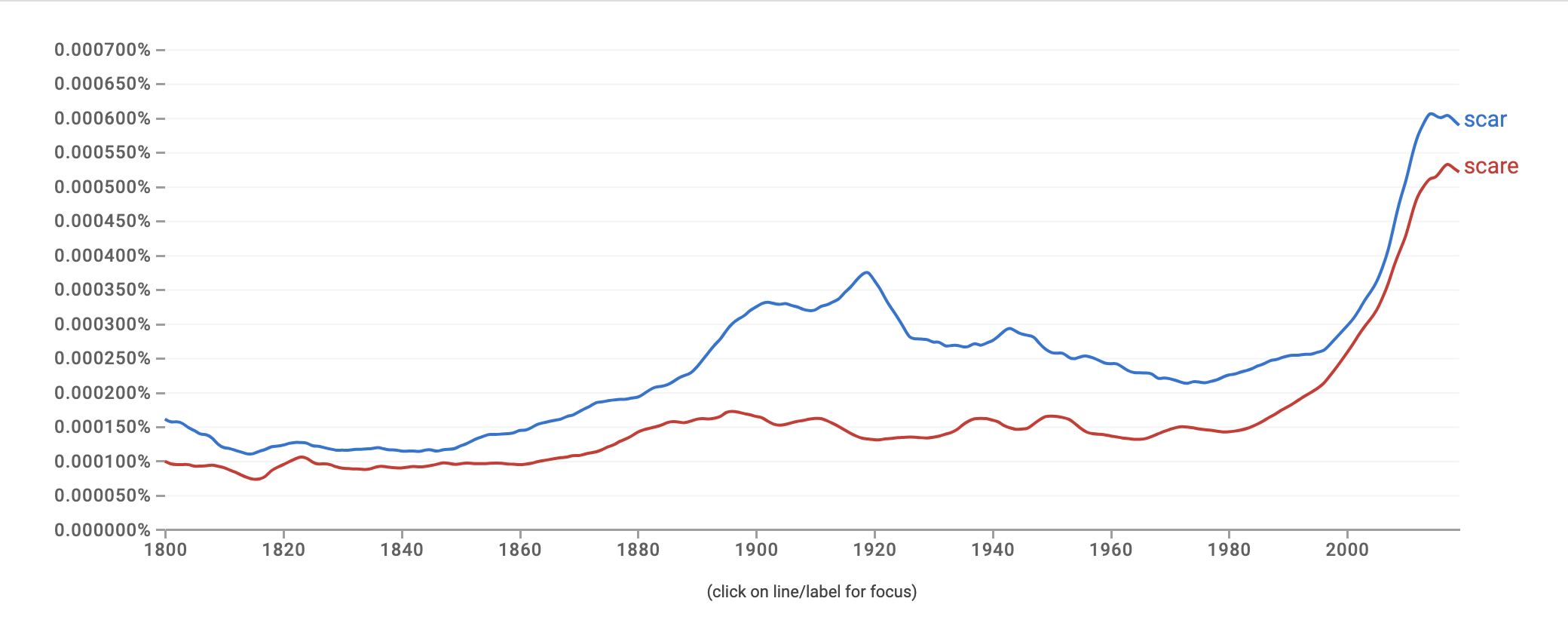- A scar is a mark left on the skin or other tissue after a wound, injury, or surgical incision has healed, often characterized by a different texture or color from the surrounding area.
- To scare means to cause fear or startle someone, often through sudden and intense surprise, shock, or the presentation of a threatening situation, leading to an emotional or physical response.

When to use "scar" and "scare"
"Scar" and "scare" are two different words with distinct meanings and usage:
Scar:
- A "scar" is a mark left on the skin or body tissue after a wound, injury, or surgical incision has healed. Scars can be visible signs of past damage or trauma.
Example: "She had a scar on her cheek from a childhood accident."
Scare:
- "Scare" is a verb that means to cause fear or alarm, to frighten or startle someone or something.
Example: "The sudden loud noise scared the cat."
In summary, "scar" is a noun referring to a mark left by healing, while "scare" is a verb describing the act of causing fear or alarm.
To distinguish between "scar" and "scare," associate them with healing: a "scar" is a mark left after a wound heals, while "scare" involves inducing fear. Connect "scar" with the aftermath of healing and "scare" with causing fear in the present.
The use of "scar" and "scare" over time
Interestingly, "scar and "scare" followed similar trajectories in terms of usage. We can see that "scar" was used slightly more frequently than "scare."

Examples sentences for "scar"
- After the car accident, she was left with a prominent scar on her forehead.
- The soldier bore the scars of battle, both physical and emotional.
- Time had faded the scar, but the memory of the injury still lingered.
- The burn left a lasting scar on his arm, a reminder of a kitchen mishap.
- Her heartbreak left no visible scars, but the pain was etched in her eyes.
- The old tree displayed scars from years of lightning strikes and storms.
- Despite the surgery, the athlete wore his surgical scars with pride as symbols of perseverance.
- The ancient ruins were marked with the scars of time and weathering.
- The dog's playful bite accidentally left a small scar on the child's hand.
- The author's experiences in war became the scars that shaped his powerful storytelling.
Examples from the web
"She was hit on the head twice with a chair, leaving a scar over her right eyelid, and was thrown on the floor, causing pain to her lower back, waist and kidneys." - The Guardian
"All that remains now is a small scar on her neck – she pulls back her scarf and points to it." - The Guardian - Film
Examples sentences for "scare"
- The sudden clap of thunder did nothing but scare the timid kitten.
- A masked figure jumped out from behind the door, trying to scare the unsuspecting guests.
- Don't sneak up on me like that—you really scared me!
- The horror movie was designed to scare its audience with unexpected twists and terrifying scenes.
- A loud bang in the middle of the night can easily scare anyone.
- The ghostly costume managed to scare the children during the Halloween party.
- The false alarm about the fire drill was intended to scare everyone in the office, but it just caused confusion.
- The haunted house was set up to scare visitors with eerie sounds and spooky surprises.
- The rumors of a wild animal roaming the neighborhood were enough to scare people into staying indoors.
- The unexpected appearance of the costumed mascot at the school rally managed to scare both students and teachers.
Examples from the web
"Clarkson has since said in his column in the Sunday Times that he had suffered a cancer scare two days before the incident." - The Guardian
"The next ones were less benign, driving through a rainstorm on the M11 in a deliberate, and not entirely unsuccessful, attempt to scare me." - The Guardian - Opinion
FAQs
Is it emotionally scared or scarred?
"Emotionally scared" is not a standard phrase. It might be a typographical error. The correct term is "emotionally scarred," which denotes lasting emotional damage or trauma.
Emotionally scarred refers to the lasting emotional damage caused by trauma or distress. The term scarred suggests the enduring impact on one's emotional well-being, akin to the lasting marks left by physical scars, shaping one's psyche with the imprints of past experiences.
What is the difference between fear and scare?
Fear is an emotional response to a perceived threat, an internal feeling. Scare, on the other hand, is the external action or stimulus causing fear. Fear is subjective and personal, while being scared involves an external trigger inducing that emotional reaction.
What is difference between scarred and scared?
"Scarred" implies lasting emotional or physical damage from past experiences, akin to the endurance of scars. "Scared" denotes a current state of fear or anxiety, often triggered by a present threat. While scars reflect past wounds, being scared reflects a current emotional response.
Summary
In conclusion, mastering the distinction between "scar" and "scare" is pivotal for effective communication. Understanding their nuanced roles—scars as lasting marks and scares as present emotional responses—enhances linguistic precision. So, navigate the language landscape with confidence, wielding these words purposefully for clearer expression.

Want to sound like a native speaker?
Engram’s AI-powered grammar checker makes your English sound like a native speaker’s, suggesting natural English expressions on top of fixing grammar, spelling, punctuation, word order, and vocabulary.

References:















